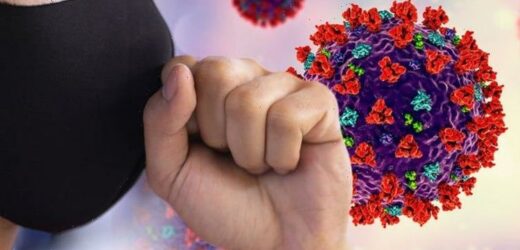NHS England preparing annual Covid booster jab programme
We use your sign-up to provide content in ways you’ve consented to and to improve our understanding of you. This may include adverts from us and 3rd parties based on our understanding. You can unsubscribe at any time. More info
The state-of-the-art tech uses an “active” air purification system that some experts claim can neutralise a wide range of pathogens, from bird and swine flu to Ebola and MRSA. Laboratory tests have now found the technology can be used to kill a mutation of the SARS-CoV-2 coronavirus that is popularly known as the Delta variant. Officially called Needlepoint Bipolar Ionisation (NPBI), the tech works by releasing “air cleaning ions” into the airstream.
Ions are any atoms or molecules that have a net electrical charge – positive or negative.
NPBI has been previously found in the US to kill the SARS-CoV-2 virus that causes COVID-19 by up to 99.9 percent.
But now the independent laboratory Innovative Bioanalysis has tested the tech against the more easily transmissible Delta variant, which was first discovered in India.
According to the lab’s results, NPBI is up to 98.7 percent effective against this coronavirus strain.


NPBI is already widely available in the US and has been deployed in parts of the White House and Air Force One, the US President’s private aircraft.
The technology is typically installed inside of duct mounting, heating, ventilation and air conditioning (HVAC) systems, but can also be used as free hanging fans in ceilings.
The charged particles released by NPBI combine with other particles already suspended in the air.
As this happens, particles of opposite charges begin to attract each other, which makes them much easier to be caught by filtration systems.
If these particles happen to contain viral pathogens, bacteria, mould or other harmful pollutants, they can, in theory, be safely whisked away.
GMB: Dr Amir Khan on 'sobering' Delta variant numbers
The US tech is being distributed in the US by Cambridgeshire-based air purification specialist, Clenzair.
Bradley Watkins, Director at Clenzair, hailed the Innovative Bioanalysis results and called them a “major breakthrough” in the fight against the Delta variant.
Because this strain of the coronavirus is more easily transmissible, it now accounts for 99 percent of Covid cases in the UK.
Mr Watkins said: “These are the first known laboratory tests to be carried out against the Delta variant, so this is a major breakthrough for air cleaning technology.
“It highlights how NPBI can play a huge role in reducing the transmission of Delta inside crowded places such as schools, care homes, hospitality settings, offices, and more.


“NPBI is the future of indoor air quality and can help stop the virus at the point of transmission.”
According to the report published by Innovative Bioanalysis, the NPBI tech was tested in a room that was eight feet tall, eight feet deep and 20 feet wide.
Temperatures in the test environment ranged between 20C and 23C (69F and 75F).
Humidity levels were also clocked in the 42 to 52 percent range.
The report went on to say NPBI “was used in conjunction with an air
handling unit designed to create and sustain achievable ion density levels that have been observed in real-world applications and that ‘mixing fans were used to disperse the ions and suspend the test specimen within the chamber’.”
There are, however, some reports to suggest ionization technologies may not be as effective as many would hope.
According to a report published by aircraft giant Boeing, “air ionization has not shown significant disinfection effectiveness.”
The conclusion followed an investigation into the technology’s effectiveness on commercial aircraft.
However, the Boeing study tested the technology on surfaces, rather than in the air, and used a “surrogate” for the coronavirus rather than the virus itself.
Source: Read Full Article


